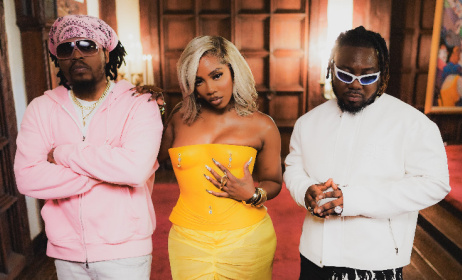How Olamide became bigger than Nigerian rap
Olamide has come a long way since ‘Eni Duro’, his debut official single. Today, he is one of Nigeria's most popular rappers. Before his appearance on the Yoruba rap scene, there was DaGrin whose status grew following his premature demise. Lord of Ajasa was before both, but his reign was rather too brief to matter too much.
A look at Olamide's career growth is in large part a consideration of his one collaborative and five solo albums, all of which are discussed below.
 Olamide
Olamide
Rapsodi (Coded Tunes, 2011)
Olamide's first album Rapsodi which loosely translates to "to rap inside out" may also be metaphorically perceived as a corruption of rhapsody in other words indirectly implying that that is what the album shall beget to its listeners.
Rapsodi had all the imprints of a debut as it is not only impetuous, and spells of a budding artist's burning zeal to make his mark and quickly rake in millions as evinced by lines on the first song on the album” I'm going in where he goes: Flashing lights, fancy cars, fancy clothes, bodyguards, na the life Wey I dey want…”
The songs on the album also swing in every possible direction: Street rap, domestic violence, patient love, kegite tunes, a gospel track—a typical budding artist's attempt to attract everyone.
The guest acts are carefully selected as well. There's a little known 2Phat (who had something close to a street hit with Enu e run in 2003); obscure Adol, AB1 and Jumoke; a little renowned Ajasa; an up and coming Reminisce; and a declining (if at all he ever was at a great height) Terry Da Rapman. Although Wizkid and 9ice also appear on the album, with 9ice being the bigger of the two acts then, Wizkid had only just released a couple of the songs to be featured on the Superstar album and 9ice being the only acclaimed one in the then top 4 (which included Tu face, P Square and Dbanj). A lesson perhaps to today's up and coming artistes who want 2Baba, Asa and Davido on their very first outing. Rapsodi says: Develop an independent act first and A-list artistes might just be the one after you after that.
If Rapsodi succeeded, it did mainly for three reasons: The song Eni duro, the video to Eni duro and DaGrin's untimely demise which created a vacuum which Olamide took no time to fill. This probably is why he has a tribute to DaGrin on the album. Further references to DaGrin appear in future works.
On YBNL, he goes Won ni mo ma DaGrin, won ni mo ma Biggie, won ni mo ma Tupac, Shakur, weaving". (They say I will end up like Dagrin, Biggie, and Tupac, but I dodged it). On Reminisce's Government--"Inu DaGrin ma ma dun gan bayi, o ma wa excited." (Dagrin would be so happy and excited right now *hearing us rap this way*)
On ‘The Game’ with Phenom--R.I.P DaGrin, mo wish e la lu ki amo, to ba ti ri Fela, teba ti se collabo, ko ji a mo." (RIP Dagrin I wish you eternal rest/when you come across Fela and you both do a collaboration, let’s know). By Street OT, perhaps tired of the comparison and supposed providence DaGrin's death bequeathed him, he goes a little maliciously on ‘Goons Mi’--"Won ni ti Dagrin ba wa laiye, mo le blow, sebi Oluwa ni'n sola, mo wa laye, Lil Kesh ti blow." (They say if Dagrin was still alive, I wouldn’t have made it, but it’s God that distributes wealth; I’m alive and even Lil Kesh has made it.). And on ‘JEGA’ in Eyan Mayweather--"Gba fun oga e, ti ja ko, DaGrin ti sofun yi Tele." (Surrender to your master, Dagrin has told you all before).
YBNL (YBNL Nation, 2012)
The next year saw Olamide release YBNL on his own label, YBNL Nation. The album escapes the famous sophomore slump. Instead it laid the foundation for future successes and established him as game-changer in the Nigerian rap scene. The beauty of YBNL (which is by far Olamide's best studio work) is that the inter-language segue is seamless—the average listener would hardly note that she is listening to rap in more than one language. Only Phyno, a few months later would do same. (Both rappers have worked together several times since 2013's 'Ghostmode'.)
YBNL established Olamide briefly as rap king and even though by ‘Sitting on the Throne’ an album later he's already unknowingly relinquishing the title considering his steep come-down from the rapping days of Eni duro and Young Erikina, the brief dominance and reign as King took him way beyond anyone's expectation.
One of the album’s songs, ‘V.O.T.S’, brings ‘Eni Duro’ to mind and dwarfs it. ‘Eni Duro’ however remains the more popular.
The album starts off as dark and then loosens up to become jaunty. Nonetheless it is a superbly arranged album. Deservedly, at the 2013 Headies, he went home with both Rap album and The Album of the Year awards.
In YBNL, Olamide achieved something his future albums were not going to get close to: he got almost everything right (including the marketing and post-release publicity). He made an almost flawless work of art with the last song in which Reminisce and Base 1 perform so well they leave an impression of their own glorious possibilities.
Baddest Guy Ever Liveth (YBNL Nation, 2013)
Pheelz who provided vocal support on the first single of Rapsodi produced Olamide's third studio effort BGEL (YBNL, 2013)—an album replete with so many melodious songs but inferior to YBNL.
The album opens with radio personality D-O-T-U-N spewing flapdoodle for a few minutes (a mistake Skales goes on to make on his Man of the year album). Then it goes on to lay bare the Olamide plan: Knock them out with a couple of great rap songs—‘Eni duro’, ‘Young Erikina’, ‘V.OT.S’, ‘Ilefo illuminati’—then, quickly, before they recover, flood them with melodious tunes: ‘Eleda Mi’, ‘Anifowose’, ‘Durosoke’.
Unlike in YBNL were the best songs are two rap songs ‘V.O.T.S’ and ‘Ilefo illuminati’ and a dance song, ‘First of All’. In BGEL, there's a reversal of sorts. The best songs are two dance songs, ‘Eleda Mi’ and ‘Durosoke’ and the rap song, ‘Sitting on the Throne’. BGEL succeeds mostly because of its melodious tunes. You can almost taste the choruses to ‘Esu Pofo’ and ‘Mu Emu’ on your taste buds. And then there is the nostalgic ‘Anifowose’, a song that makes you wonder if a marriage between hiphop and fuji has been rendered better.
The album also hosts perhaps Olamide’s first attempt at inventing a dance. On ‘Position Yourself’, he dictates the moves: "You go support your waist with your left hand or your right hand, then you go put the other one up like say you be LASTMA, wave it round, round…”
He succeeds at inventing a dance on ‘Bobo,’ two solo albums away. Interestingly, on that song he gives no instructions; the video takes care of the dance directions.
Street OT (YBNL Nation, 2014)
The Intro on this album is outstanding—an upgrade from BGEL. Street OT (YBNL, 2014) is the most indigenous album in the Olamide oeuvre, as the rapper averages more Yoruba words over English than on any other album. This prompted many to declare the young man finished—an unfortunate assertion considering this was the young man's fourth studio album in four years.
On Street OT, Olamide tries too hard to find the magic of the YBNL album. The two most popular songs on the album ‘Skelemba’ and ‘Story for the Gods’ are dance songs. The album’s most popular rap song, ‘Goons Mi’ is inferior to both Eni duro and voice of the streets, and even though ‘Prayer for Client’ is a good rap song, its shoulders aren't wide enough to carry the album the way ‘Sitting on the Throne’ and ‘V.O.T.S’ carried BGEL and YBNL respectively. . As good as these songs are, Olamide's return to rap is late as MI’s The Chairman having been released and gathering momentum has shifted focus from him, and perhaps, the rap crown as well. One can infer that Olamide knows this for he ends the album with Eni Sun, a song in which he declares "In the streets there's only one crown o". A submission. A step aside from sitting on the thrown of the entire rap genre to wearing the crown of a sub-genre, street rap.
If Lil Kesh's success so far is anything to go by, it is on Street OT that he justifies why he's Olamide's primary focus instead of Viktoh who introduced him to YBNL. Kesh subdues Olamide on ‘Oga Nla’, is more lewd and lyrical than Olamide and Chinko Ekun on ‘Bang’ and easily carries the day on ‘Usain Bolt P’.
In Street OT, Olamide sends a clear message: He no longer wants comparisons with rappers. He's conquered that field (regardless of how transient his reign was). He's moved on. On ‘Zero Joy’, he wants his name mentioned alongside those of Yoruba deities, Sango and Obatala, and great musicians, Fela, Bob Marley, Tuface and Lucky Dube. He wants a larger share of the cake, same way Kanye West declared mid-performance at the 2015 Glastonbury music festival that he's "the greatest living Rockstar on the planet."
Note: Rockstar not Rap star. In comparing himself to those artists, Olamide vindicates his recent "pop" status, his success as singer and rapper at the same time. It’s an iconic position to maintain because at the time of this album when you mention Wizkid and Davido, the next name that comes to mind is Olamide not Ice Prince (who raps and sings in Hausa, by the way) or even Wande Coal, the supposed leader of the New School. Likewise, when top rappers in Nigeria are mentioned, it’s MI, Phyno and Olamide that are mentioned.
There's a message in this dual ability: Seeking glory or relevance outside one's core field is audacious. It is enough to inspire the envy of many rappers. Even Eminem on Rap God defends his dual abilities by saying he doesn't know how to make music that isn't mainstream or lean towards pop. Because he's "kinda found a way to fuse it".
Still, at the 2015 Headies, Olamide is punished for the average outing on Street OT, losing his two-year Best Rap Album reign to MI's The Chairman.
2 Kings (YBNL Nation/Penthauze/Sputnet, 2015)
Olamide’s collaborative effort with Phyno after over a year of stalling is finally released in 2015. The album opens with Olamide's most commanding opening sentence: Lion meji ti wole, Iya yin e gan pa, (Two lions have come in, you all should stand still). The statement has enough force to reverberate through the length of the album.
‘Cypher’, the first song on 2 Kings, is also the closest to Ghostmode's intensity and technicality. It sets a tempo that is unmatched by the remaining nine songs on the album. It is also replete with great lines like: "Street boy lemi, mo si ma'n je bread ati akara";(I’m a street boy, I still eat bread and Akara ). “Ibile to the fullest, Versace lori Ankara”. (Indigenous to the fullest, I wear Versace on my ankara).
His rap skills which had been questioned lately is temporarily restored on ‘Koba Koba’ considering the technical marvel with which he rides on the song, one can almost perceive Phyno keeping his distance to allow Olamide combust.
The obvious hit on the song ‘Ladi’ which talks about a man's headstrong decision not to perform cunnilingus on his partner has Phyno (for the first time perhaps), attempting Yoruba. The usually lewd Lil Kesh soars here.
‘Real Nigger’, produced by Pheelz, is an exciting song that throbs with an uptempo fervor and is reminiscent of ‘Stupid Love’ in the way Olamide begins to spew inanities having run out of things to say. Just as it worked in Stupid love, it works here too and the way the song segues into ‘Confam Ni’ is noteworthy.
The entire purpose of 2 Kings is revealed on the last track ‘For my City’, where Olamide goes "Shebi awa la switch game yi up". (Aren’t we the ones that switched the game up?) A fact that doesn't take away the failure of the album. It fails to match ‘Ghostmode’, the duo’s first collaboration. A testament perhaps to the magical properties of poverty.
Eyan Mayweather (YBNL Nation, 2015) and beyond
From the street-themed album cover there's an indication that it would be an album dedicated to the streets, and it is. Eyan Mayweather (YBNL, 2015) shows the rapper’s versatility from the eponymous non-chorus ‘Eyan Mayweather’ where he declares himself the best rapper solely on his ability to shut down shows on four different continents (similar to Jose Mourinho’s declaration of being the Only One to win league titles in four countries including being the first to succeed in the three major leagues in the world), to the bouncy tunes of ‘Inferiority Complex’ and ‘Don’t Stop’, to his attempts at luring Hausa speakers to hip-hop on ‘Say Something’, to the dance singles ‘Matters Arising’, ‘Lagos Boys’ and ‘Bobo’, to the ode to his mother on ‘Mama mi’, the melodious ‘Melo Melo’, the gyration tunes of ‘Sold Out’ and finally, his version of ‘Just the two of us’ on ‘Toriomo’, one thing is clear: Olamide’s talent has no confines.
His decision to feature no one on this album may be interpreted as a statement considering MI had a guest artist on every song on The Chairman.
The dance single ‘Bobo’ (perhaps his greatest song so far) is a joyous tune with an underlying inspirational message to his "bobos" on the street that should they want the good life that involves buying Bentleys and travelling to Paris, they should be ready to "shakiti", that is, till. Its got an upliftment ring to it and is the only song produced by the wonder boy producer, Young John.
Olamide's claim to be best rapper based on his ability to shut down Eko Hotel may be valid, considering how boastful American rappers get after they shut down Madison Square Garden. Perhaps, Eko Hotel is the Nigerian Madison Square Garden. He boastfully goes on to warn other rappers not to dare it. And honestly, I don't think anyone of them would. Not even the posh ones.
‘Kana Finish’, the centrepiece of Eyan Mayweather is also the song at the centre of the album. On it, Olamide re-emphasizes his commitment to the streets and intelligently wraps it in the following sentences: "Awon street ti binu to ni awon o gbo oyinbo, ti ba se English rap, mi o le rap to Oyinbo." (The streets are angry saying they don’t understand English besides even if I rap in English, I can’t do it better than Americans); "Oti ni pe mi o like ki ma rap pelu English, e lo ra album awon to ma'n rap pelu English". (They say I don’t like to rap in English, I’ve told them to go buy the albums of those who rap in English.). And on the third verse: "Ni Ibadan, mo da bi Justin Bieber, ko le ye eyin olote, e’n se belieber.”(In Ibadan I’m like Justin Bieber, you haters won’t understand, you aren’t beliebers).
Olamide has made five albums in five years—the only rapper to have done so. He is about to release his sixth, and should he decide to retire afterwards, he'll remain Nigeria's most exciting and original rapper ever.



































Comments
Log in or register to post comments